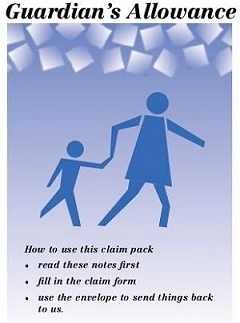Guardian’s Allowance Rates and Payments
This type of welfare benefit is most applicable for people who are looking after (e.g. raising) someone else’s child. Even so, the special guardianship allowance rates 2022 do not “only” apply for circumstances where both parents have died. In some cases, you may qualify for the weekly rate in situations where there is one surviving parent.
Important: The special guardianship allowance rates are paid on top of any claim for Child Benefit that you may already be receiving.
The payment is not taxable (e.g. it is one of the non-means tested welfare supplements). But, you would need to inform the Guardian’s Allowance Unit about any changes to your household circumstances.
If you qualify, you will get the current weekly allowance rate of £18.55 (per child and tax free). Remember, they will send out the payments in addition to regular Child Benefit payments.
The money is paid into a secure bank account every four (4) weeks. Even so, some exceptions apply to the usual benefit payments frequencies.
For example, single parents (or the claimants of certain other types of social security benefits) can get paid every week.
The guardian allowance payments cannot usually be paid into:
- A Nationwide Building Society account (if it is in someone else’s name).
- Business and building society accounts which use a passbook and certain other mortgage accounts.
- Child Trust Fund accounts or children’s accounts.
- National Savings and Investments (NS&I) accounts (apart from NS&I Investment Accounts and Direct Saver Accounts).
Note: It is also recommended not to use Individual Savings Accounts (ISAs) to receive payments. The reason is because many have upper limits on the amount of money deposited in them.
The Guardian’s Allowance child benefit does not affect other welfare support. Hence, the DWP will not count it as income if you are already claiming (any):
- Income-based Jobseeker’s Allowance (JSA)
- Income Support
- Tax Credits
- Income related Employment and Support Allowance (ESA)
Furthermore, the High Income Child Benefit tax charge does not affect the payments and special guardianship allowance benefits can continue even if you decide not to receive Child Benefit.
You can use the benefit cap to check the upper limits for people aged 16 to 64. The benefits calculator helps you work out what other financial help you can get.
Guardian’s Allowance Eligibility Criteria
As a rule, you will qualify for special guardianship allowance rates 2022, if (all):
- You are caring for, or bringing up, someone else’s child because both parents died (some exceptions apply if there is a surviving parent).
- You meet the eligibility criteria for Child Benefit.
- One of the parents was born in the United Kingdom (or living in the UK since the age of sixteen for at least fifty two weeks in any two year period).
Note: Adoptive parents may still qualify providing they were already getting the allowance before child adoption occurred.
Situations with One Surviving Parent
You might still be eligible to receive the Guardian’s Allowance if any of these situations apply to your particular circumstances:
- You do not know where the surviving parent is living.
- The child’s parents were not married (the mother died and the father is unknown).
- A surviving parent is going to be imprisoned for a period of at least two years from the date of death of the other parent.
- The parents got divorced or their civil partnership dissolved; the surviving parent does not have custody and is not maintaining the child; and there is no court order in place saying they should.
- A court order has placed the surviving parent in a hospital.

How to Claim the Special Guardianship Allowance
The Guardian’s Allowance payments can be backdated for a period of up to three (3) months. Nevertheless, you should start claiming for special guardianship allowances once the child starts living with you (e.g. to reduce the risk of losing money).
You can make a claim by following these two steps.
- Fill in the specific Guardian’s Allowance claim form BG1.
- Mail it to the Guardian’s Allowance Unit along with the originals of the child’s full birth certificate and parents’ death certificates. They only need one death certificate if only one parent died.
You can contact HM Revenue and Customs (HMRC) if you have a question about the Guardian’s Allowance. They can also provide you with a claim pack and take notification if you report a change of circumstance.
Telephone: 0300 322 9080
Textphone: 0300 200 3101
Opening times: 8.30am to 4pm (Monday to Friday)
Closed on United Kingdom Bank Holidays.
You can post your claim form to HM Revenue and Customs or write to them to report a change of circumstances.
HMRC Guardian’s Allowance Unit
Child Benefit Office
PO Box 1
NE88 1AA
Newcastle upon Tyne
United Kingdom
If Your Circumstances Change
Entitlement to the guardian allowance can be affected when circumstances change. In some cases, the payments could stop completely.
Hence, claimants must report changes without delay either (e.g. by telephone or post). Often, you can also do this online, such as if:
- The child starts living with someone else or leaves full-time education (or approved training).
- You go abroad, either temporarily (for more than eight weeks), or permanently (for more than one year).
- Your bank details change (or your contact information).
- You learn where the surviving parent is living, or they start making a payment towards the upkeep of their child.
- The surviving parent comes out of hospital or prison (or has their type of prison sentence shortened).
Appeal a Decision or Make a Complaint
If you disagree with a decision you can appeal to the Social Security and Child Support Tribunal. But, there have been some procedural changes.
You must now ask for ‘mandatory reconsideration’ to challenge a benefit decision before you can make the actual appeal.

